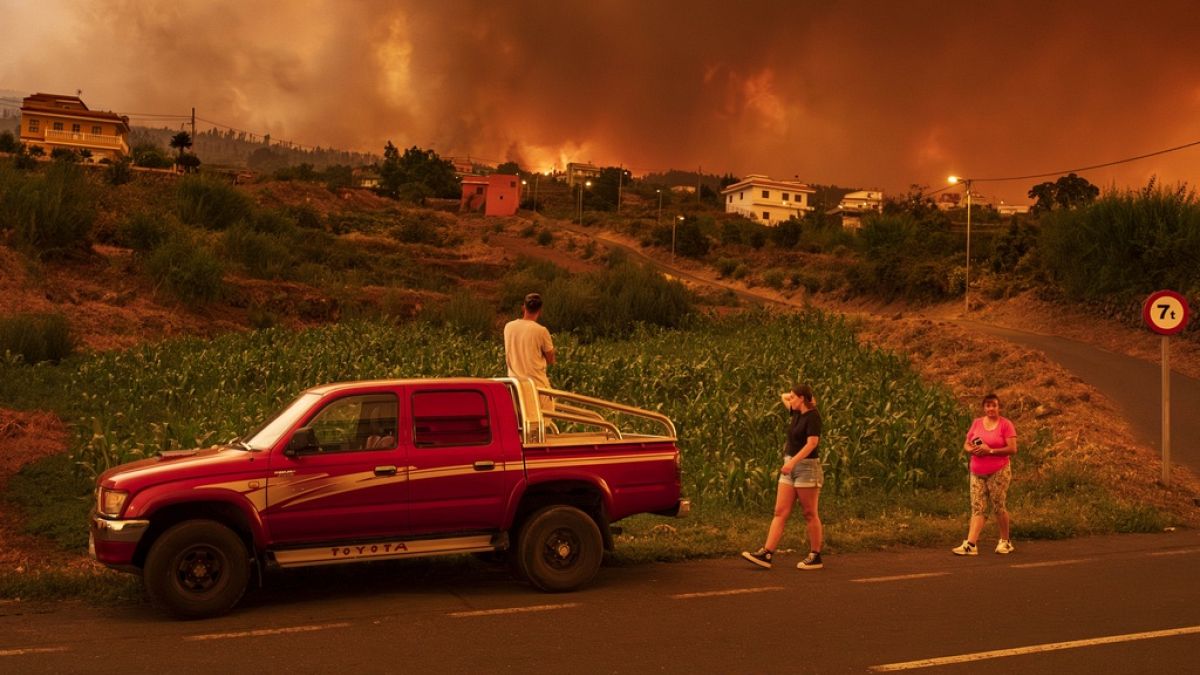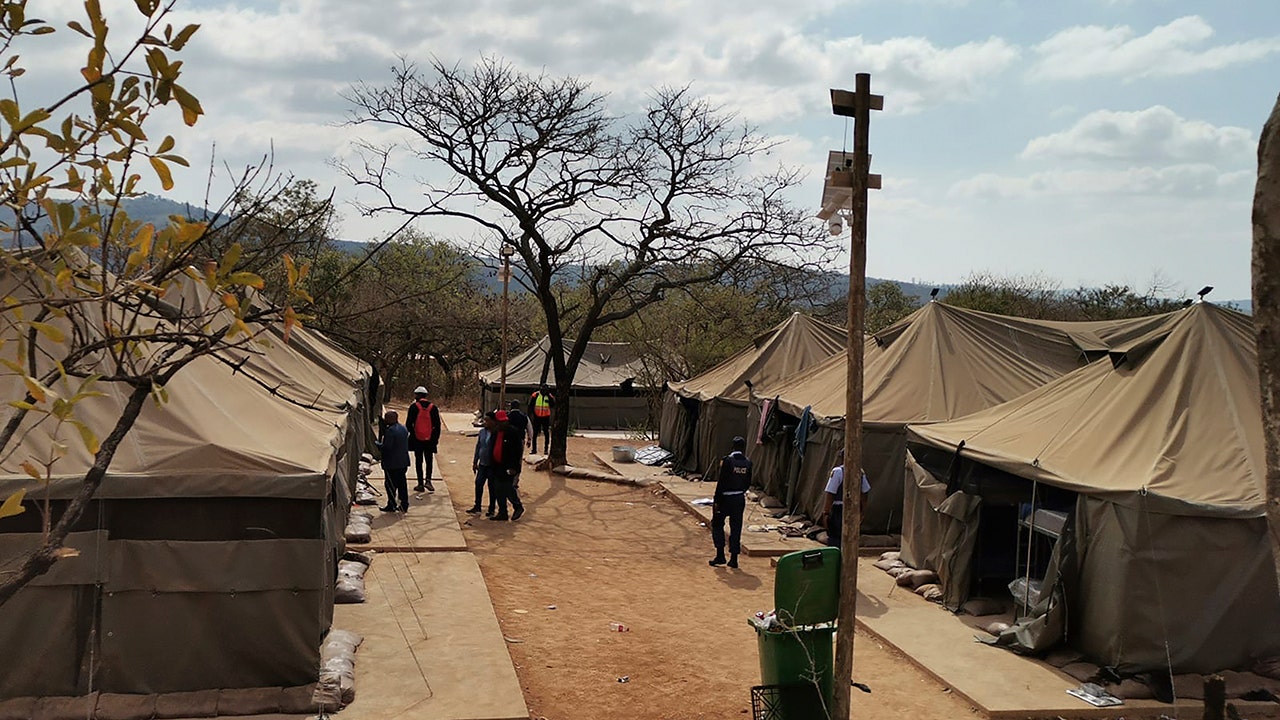World
Wildfire season is upon us: Here's what the EU is putting in place

Following a devastating summer of fires across Europe last year, the EU has upped its resources to prevent widespread damage in 2024.
With summer just around the corner, we’re all dreaming of sunshine and swimming in the sea – but with the hot weather comes the risk of wildfires.
That’s where the European Union comes in. From June, they’re putting in place measures to bolster firefighting efforts in order to better protect communities across Europe – and the surrounding environment.
Following devastating fires in 2023 – recorded as some of the very worst this century – the EU has put together a team of 556 firefighters from 12 countries.
They’ll be strategically placed across key locations in Europe this summer, including in high risk areas like France, Greece, Portugal and Spain.
Local fire brigades can find themselves overwhelmed when the scale of a wildfire outsizes the response capabilities of a country.
The EU are also introducing a dedicated rescue fleet of firefighting aircraft, which will consist of 28 aeroplanes and 4 helicopters stationed in 10 of the bloc’s Member States.
There’s also €600 million in extra EU funds which will go towards buying 12 further firefighting planes in the future, which will be distributed among six Member States – as well as several helicopters.
Here’s what four of the countries involved are planning to do this summer to save lives, livelihoods and protect the environment when wildfire season arrives.
France
Météo-France recently announced they believe the summer of 2024 will likely be hotter than usual – especially in the Mediterranean region.
Last year, 22,400 hectares of forests were lost to wildfires. Using that tragic example, France has put in place some 3,600 firefighters and 600 vehicles, whose role will be to strengthen the resources of the Departmental Fire and Rescue Service – known as the SDIS.
The resources come from regions typically less affected by forest fires and will bolster the work done by departments more likely to experience them.
France also has twelve Canadair CL-415s planes, which can each carry more than 6,000 litres of water. Two of them are positioned in Ajaccio in Corsica and the other ten in Nîmes.
They’ll be supported by a further eight Dash planes – seven based in Nîmes and another in Bordeaux. They can each carry 10,000 litres of water.
As of 1 June, they’ll be on active service as and when they are needed alongside a number of other aircraft with firefighting capabilities.
Portugal
2023 was an intense year of wildfires for Portugal and, as such, the country’s rural firefighting system will be reinforced from 1 June for the second time this year.
Ahead of the summer season, there will be some 12,096 operational units and 70 aircraft available for use.
Many of the people involved in the Special Rural Fire Fighting Device (DECIR) are volunteer firefighters. Others will be drawn from the Special Civil Protection Force, military personnel from the National Republican Guard and also from the Institute for the Conservation of Nature and Forests.
Unlike in France, Portugal will not be using Canadair planes, apparently due to difficulties in the market. That came as a surprise to the crews who had been carrying out this service for over 20 years.
With the weather heating up from July, resources are set to be reinforced again from the first of the month until 30 September – the period considered as the most critical phase of fires.
In that three month stretch, 14,155 operational personnel from 3,162 teams will be on standby this year, as well as 3,173 vehicles – which is a slight increase compared to 2023.
Spain
2023 saw hundreds of thousands of hectares of woodland destroyed in Spain, as well as more than 3,000 people forced to evacuate the Canary Island of Tenerife in the summer season.
From 1 June, the Spanish state forest fire campaign is in place. Taking in consideration the tragedies of last year, authorities have introduced a more robust plan to more effectively fight any potential forest fires occurring in different areas of the country.
Last month, at a meeting of the State Coordination and Direction Committee (CECOD) in Spain, politicians came together to finalise plans.
It includes the Forest Fire Reinforcement Brigades (BRIF) and a fleet of high-capacity seaplanes, which is operated by the 43 Group of the Air and Space Army.
The Military Emergency Unit of the Ministry of Defence and the Civil Guard and National Police will be able to support devices put in place by the country’s various autonomous communities.
Catalonia has historically been one of the worst affected regions in Spain.
The acting Minister of the Interior, Joan Ignasi Elena, highlighted that it “faces an extremely complex campaign, which is not temporary and which has severe consequences.”
As a result, 240 new firefighters have been recruited to join hundreds of others.
The Corps of Rural Agents has gone from having about 500 troops to a total of 620 in the face of the increased forest fire campaign.
There will also be 22 aircraft including planes and helicopters, with 4 amphibious craft located in Sabadell and Empuriabrava, supported by 821 cars and vans.
Less than halfway through the year, 2024 has been recorded as one of the driest ever in Catalonia in decades.
Between 1 January and 15 May 15 this year, firefighters have already battled 1,750 vegetation fires. That figure is slightly down on last year, though, thanks to heavy April rains.
Despite this, authorities have installed 5 levels to their climate emergency plan – meaning that they are as prepared as possible to fight any potential blazes ahead.
Italy
“Good prevention, with the full involvement of municipalities and citizens, can serve to save thousands of hectares of vegetation,” Nello Musumeci, the Minister for Civil Protection in Italy said at a meeting earlier this spring.
Called to address this summer’s forest fire fighting campaign, the meeting was attended by representatives of Italy’s regions (ANCI), the Fire Brigade, the Armed Forces, as well as the Ministries of the Interior, Defence, Environment, Agriculture and Economy.
Italy is currently facing temperatures well above the usual, which have a knock on effect on the availability of water.
The south of the country and the islands are particularly likely to be affected, but all administrations in Italy have prepared contingencies for both forest fires and those in built up areas.
As well as this, Musumeci has made sure to put in place a widespread campaign of raising awareness among populations via the media.
While many fires are due to climate change, he has a further plan.
“I will suggest the opportunity for greater surveillance in rural areas to discourage arsonists and criminals in their senseless purposes,” Musumeci suggests, “let’s remember that the vast majority of fires are caused by humans, through fault or malice.”

World
Celine Dion Makes Triumphant Comeback at Paris Olympics Opening Ceremony — Watch Full Performance

ad
World
95 Libyan nationals arrested in South Africa at suspected secret military training camp

South African police arrested 95 Libyan nationals in a raid on a suspected secret military training camp on Friday and authorities said they were investigating whether there were more illegal bases in other parts of the country.
The camp was discovered at a farm in White River in the Mpumalanga province, about 360 kilometers (220 miles) northeast of Johannesburg, police said.
ELEPHANTS KILL TOURIST IN SOUTH AFRICA AFTER HE TRIED TO GET CLOSE TO TAKE PICTURES
National police spokesperson Athlenda Mathe said in a post on the social media site X that the Libyans stated they had entered the country on study visas to train as security guards, but police investigations suggest they have received military training.
The Newzroom Afrika TV news channel broadcast pictures of the site of the arrests, showing a military-style camp with large green and khaki tents set up in a row. Dozens of men were seen lining up as they were arrested. They were wearing civilian clothing.
Local government official Jackie Macie said investigations were ongoing and the owner of the farm would be questioned. He said authorities received information that there were similar secret camps near two other towns in Mpumalanga province.
A camp where 95 Libyan nationals were arrested on suspicion of running an illegal military camp are seen lining up after their arrest on Friday, July 26, 2024 in White River, South Africa. Police say that 95 Libyan nationals were arrested on suspicion of receiving training at a secret military camp in the north of the country. (AP Photo/Bulelwa Maphanga)
The province borders neighboring countries Mozambique and Swaziland and is an area of concern for South African authorities with regards to illegal immigration.
Police and authorities have not said whether the camps are suspected of being connected to a particular group or conflict.
Macie said investigations would establish if there was a network of camps in South Africa and show “why they are here doing military training in our country.”
Police said the men may be linked to crimes reported in communities close to the farm in recent months.
“We have serious cases which have been opened with the police, including cases of rape and armed robberies, which complainants claim were committed by unknown foreigners who seem to be of Asian descent,” said police spokesman Donald Mdhluli.
“We take what we have found here today very seriously because we don’t know who was training them, what were they being trained for and why that training is happening here in South Africa. It may be a threat not only to South Africa but also to the entire southern Africa region.”
Police said the operation to arrest the Libyans and close down the camp began two days ago. Macie said the Libyan nationals had been in the country since at least April.
“The 95 individuals taken into custody are all Libyan nationals and are currently being questioned by the relevant authorities,” Mpumalanga acting provincial police commissioner Maj. Gen. Zeph Mkhwanazi said in a statement.
Mdhluli, the police spokesman, said the country’s security regulator had confirmed that the kind of training that appears to have been taking place at the camp was well beyond the scope of training for security guards.
“The kind of equipment we found here shows that there was intense military training taking place here. This was basically a military base.”
World
Passengers face long, uncertain wait at stations amid rail disruption

A deliberate fire in a signal box about 60 km south of Lille caused the disruption on the northern high-speed line, with traffic halted around 5 a.m. local time on Friday.
Travel was severely disrupted in Lille on Friday, one of the stations affected by the sabotage that hit major French rail lines ahead of the Paris Olympics opening ceremony.
Many passengers waited with hope that soon turned to resignation.
“We’ve been waiting since 10:38 a.m. for the 11:38 a.m. train, and now we’re just waiting for it to arrive at 2:08 p.m.,” said Delphine, one of the stranded passengers.
“It’s still quite a delay, and we’ll be even later since we’re on a secondary route. I work in Avignon at 9 p.m., so it’s going to be very, very tight. We have a concert tonight — will it even happen? This is all very confusing, and we don’t understand what’s going on.”
For one traveller, this was a rough start to the holidays. “The worst case would be if the train is cancelled entirely and we have to buy new tickets for next week. It would shorten our already brief vacation. That would be a huge problem,” said Hippolyte.
When asked if he had been informed of the delays, Hippolyte said he received the notification just before departure.
“At around 10 a.m. this morning, we were told we were an hour late and would be leaving at 1 p.m.”
“It just keeps getting later as the day goes on. Every time we approach the new departure time, it gets pushed back another hour and a half, or half an hour each time.”
A deliberate fire in a signal box about 60 km south of Lille caused the disruption on the northern high-speed line. Traffic was halted around 5 a.m. on Friday.
The recent acts of sabotage on the rail network highlight that the Olympic Games are turning France into a prime target.
The attack disrupted the transport system on the opening day of the Games, causing delays of up to two hours or even cancellations that affected hundreds of thousands of passengers nationwide.
Authorities in Paris have said they are deploying substantial human resources to counter any threats and to ensure the safety of the events.
-

 World1 week ago
World1 week agoOne dead after car crashes into restaurant in Paris
-

 Midwest1 week ago
Midwest1 week agoMichigan rep posts video response to Stephen Colbert's joke about his RNC speech: 'Touché'
-

 News1 week ago
News1 week agoVideo: Young Republicans on Why Their Party Isn’t Reaching Gen Z (And What They Can Do About It)
-

 News1 week ago
News1 week agoIn Milwaukee, Black Voters Struggle to Find a Home With Either Party
-

 Politics1 week ago
Politics1 week agoFox News Politics: The Call is Coming from Inside the House
-

 Movie Reviews1 week ago
Movie Reviews1 week agoMovie Review: A new generation drives into the storm in rousing ‘Twisters’
-

 News1 week ago
News1 week agoVideo: J.D. Vance Accepts Vice-Presidential Nomination
-

 World1 week ago
World1 week agoTrump to take RNC stage for first speech since assassination attempt



















